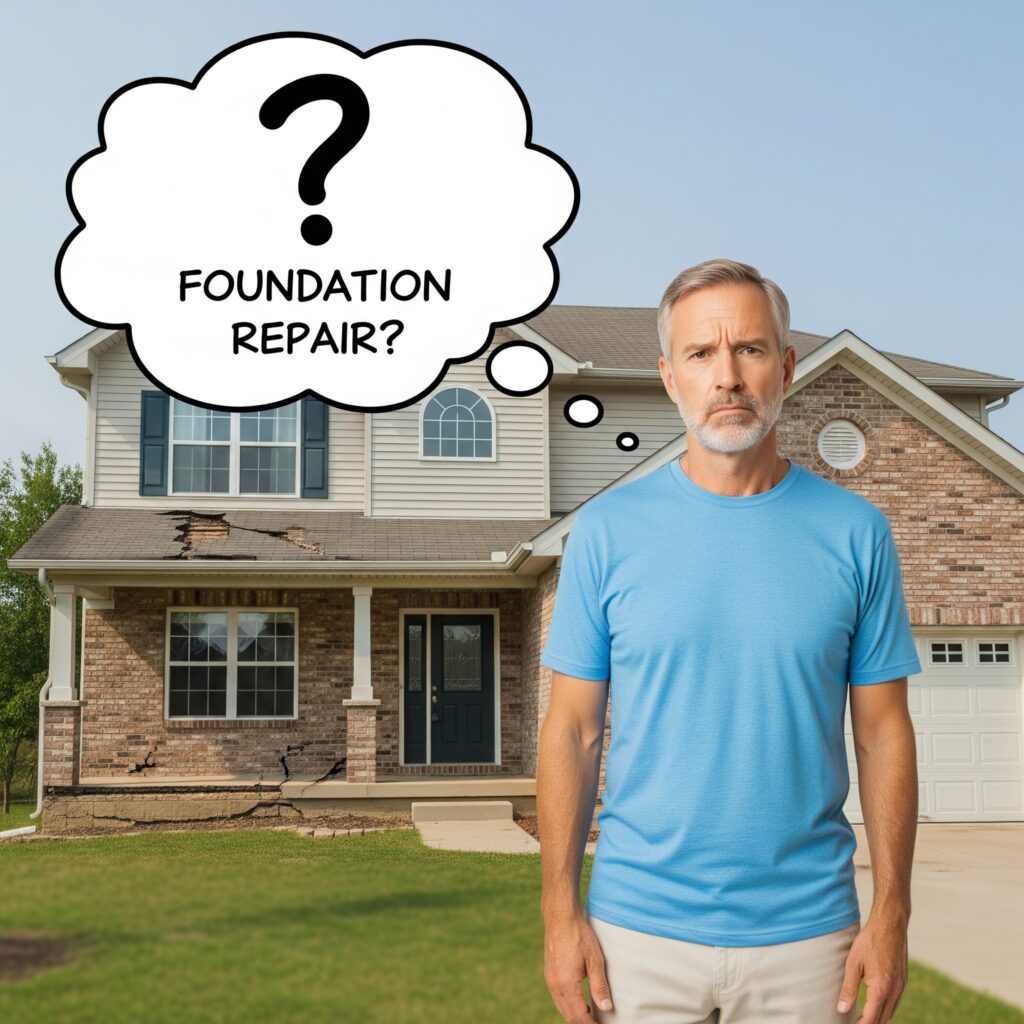Frequently Asked Questions About Residential Foundation Repair

Appalachian Foundation Services is dedicated to guiding homeowners through the foundation repair journey—from early signs to expert repair and long-term value. Our comprehensive Frequently Asked Questions cover everything you need to know about residential foundation repair, ensuring clarity, confidence, and structural integrity.
1. What Are the Early Signs of Foundation Problems?
Identifying foundation issues early can save you time and money. Watch for these warning signs:
- Cracks in walls, drywall cracks, or cracks in the concrete slab.
- Uneven floors—sloping or sagging.
- Sticking doors and windows or new gaps.
- Bulging or bowed walls.
- Gaps between the wall and the ceiling corners.
- Moisture issues in the crawl space or basement, including standing water.
- Bubbling paint, mold growth, or musty smells.
- Leaning structures like chimneys.
Even small foundation cracks should be inspected by a professional to catch foundation shifting before it worsens.
2. How Can I Be Sure I Need Foundation Repair?
If you notice the signs above, don’t wait. Especially after seasonal changes or storms—when water infiltration and soil conditions can change rapidly—a foundation expert should evaluate your home.
Immediate action leads to more cost-effective and minimal disturbance repairs. Waiting may allow the foundation to settle further, increasing costs and extending project time.
⭐️⭐️⭐️⭐️⭐️ Keith Roberts
“Having to do foundation work on homes is always worrisome and costly. I’m so thankful we chose Appalachian Foundation to do ours! Battling 2 weeks of rain, they went above and beyond to protect the work area, communicated every step, explained what they were doing and why, and finished the job in a timely manner. They cleaned up everything at completion. Highly recommended!”
3. What Causes Foundation Damage?
Your home’s foundation doesn’t exist in a vacuum. Common culprits include:
- Poor soil conditions, such as expansive clay or unstable fill.
- Improper drainage correction, frequent standing water, or poor landscaping.
- Weather extremes and plumbing leaks that wash away support.
- Tree roots exert pressure and absorb essential moisture.
- Foundation heave (upward movement) and settlement occur to varying degrees.
Finding the cause of the problem is the first step to fixing it right.
4. What’s Included in the Foundation Inspection?
During the inspection, our foundation specialist will:
- Assess foundation cracks, moisture issues, and visible signs of movement.
- Check for damage in the crawl space, slab, or basement.
- Evaluate soil conditions and drainage around the property.
- Look at plumbing leaks, landscaping concerns, and utility interference.
- Provide a written summary and detailed repair proposal.
This thorough evaluation ensures you fully understand your home’s foundation.
5. What Foundation Repair Methods Are Available?
Selecting the best foundation repair methods depends on your specific repair plan. Options include:
- Helical piers or helical piles.
- Push piers.
- Carbon fiber straps.
- Slab jacking (mud jacking).
- Crack injection (epoxy or polyurethane).
- Wall anchors.
- Foam injection.
- Auxiliary systems include French drains, sump pumps, and root barriers.
No two homes are identical. Consulting a structural engineer ensures that you receive an optimal solution tailored to your specific needs.
⭐️⭐️⭐️⭐️⭐️
Caroline Beatrous
“Hunter and his crew were amazing to work with. We had a horizontal crack in the foundation of our very old house, and Hunter came out promptly to assess the damage and provide a repair estimate. They were timely, communicative, and professional. They answered all our questions and addressed every concern! Would recommend them to anyone needing foundation work!”
6. When Should Foundation Repair Be Scheduled?
Timing can affect your bottom line:
- Non-urgent work is often less expensive in the off-season.
- Severe issues—such as bowing walls, active foundation leaks, or settlement—require immediate attention.
Postponing repairs can lead to more serious damage and cause setbacks when selling your home or maintaining comfortable living conditions.
7. How Long Do Foundation Repairs Take?
While simple fixes might take a single day, more involved or multiple repairs can stretch to a week or even weeks for significant structural jobs. Early detection is the best way to ensure:
- Most foundation repairs are fixed quickly.
- Minimal interruption to all the utilities or routine.
Accurate timelines provided by your contractor.
8. What Does Foundation Repair Cost?
Although pricing depends on your soil conditions, foundation type, and the chosen method, typical costs range from $2,000 to $10,000 for standard repairs and can exceed $20,000 in severe cases. A detailed repair proposal ensures transparency, letting you compare options and avoid hidden costs.
9. Will Homeowners Insurance Cover Foundation Repair?
Most homeowners’ insurance policies cover foundation damage only if tied to a covered event, such as a plumbing leak, fire, or storm. Soil movement, moisture problems, or aging are typically not covered by these policies. Submit your documentation and be prepared to demonstrate causation.
10. How Do I Choose the Right Contractor or Engineer?
Choosing wisely makes all the difference:
- Begin with a licensed structural engineer.
- Select a local foundation specialist with deep knowledge of your regional climate, soil, and construction norms.
- Vet companies through references, reviews, and local licenses.
- Review a detailed repair proposal, education process, timeline, pricing, and warranty.
11. Does Foundation Repair Affect Home Value?
Investing in foundation stability doesn’t just protect your structure—it protects equity:
- Professionally repaired foundations, supported by engineering reports, can maintain or boost resale value.
- Buyers and lenders feel reassured with documented evidence of repairs.
- Homes in hot real estate markets sell faster with no hidden risks.
- Delayed action or unchecked quality work can lead to low offers and mortgage denials.
12. Can I Sell My Home with Foundation Issues?
Yes, but it comes with challenges. Unrepaired foundation problems can reduce your home’s value, delay closings, or scare off buyers entirely. On the other hand, professionally completed repairs, especially those backed by a structural engineer, can make the sale smoother by:
- Providing documentation that reassures buyers and appraisers.
- Preventing low offers due to uncertainty.
- Ensuring the home is fully insurable and financeable
If planning to sell, addressing existing cracks, uneven floors, or foundation shifting early is a smart move.
13. Can Foundation Repairs Be Done in Stages?
Yes, depending on the severity of the foundation issues, your repair plan may include phased solutions. This is especially helpful when:
- Professionally repaired foundations, supported by engineering reports, can maintain or boost resale value.
- Buyers and lenders feel reassured with documented evidence of repairs.
- Homes in hot real estate markets sell faster with no hidden risks.
- Delayed action or unchecked quality work can lead to low offers and mortgage denials.
We’ll walk you through your options and prioritize the most urgent fixes first.
14. What Should I Do Before Cosmetic Renovations?
Complete your foundation repair and document it before undertaking flooring, painting, or other aesthetic updates. Fixes to your structure must come first to prevent rework and wasted investment.
15. How Should I Maintain the Foundation After Repairs?
To protect your investment:
- Keep gutters and downspouts clean.
- Install root barriers.
- Conduct regular inspections of the foundation in areas that are vulnerable.
- Maintain records of all work, quotes, and warranties.
⭐️⭐️⭐️⭐️⭐️
Debbie Lafon
“Appalachian Foundation Services did foundation work in my crawlspace, as well as mold remediation. They kept me informed during the entire process, from estimate to completion. They were prompt in answering any questions I had. It was a pleasure to work with Hunter and his crew. I would definitely recommend their services.”
16. What Happens If I Wait Too Long?
Delaying foundation repair can lead to the following:
- Worsening foundation damage.
- Higher repair costs and longer timelines.
- Structural damage that spreads to walls, floors, and plumbing.
- Homeowners’ insurance is denying claims tied to pre-existing conditions.
Most repairs are manageable if caught early, especially with a proper repair plan in place.
Your Foundation, Our Priority
When foundation repair begins, it’s not just about fixing surface cracks—it’s about restoring your home’s stability from the ground up. Because the ground beneath your structure is often the root cause, our repair strategies address both visible damage and deeper issues, such as shifting soil or trapped moisture. As your foundation settles into its newly reinforced state, we utilize proven methods, such as helical piers and carbon fiber, along with other advanced solutions, to bring your home as close as possible to its original position.
Many homeowners don’t realize the significance of foundation issues until problems start disrupting their daily lives. There are several reasons to act quickly: safety, value, and avoiding long-term repair costs. From the initial inspection to coordinating with engineers and locating all utilities, our team will handle all necessary contacts to ensure a smooth, professional experience with minimal disturbance. Because when it comes to your foundation, peace of mind starts with the right partner.
Why Foundation Repair Matters
- Thorough inspection by a structural engineer.
- Customized, cost-effective repair strategies.
- Use of modern technologies: helical piers, carbon fiber, or foam injection.
- Efficient work with minimal disturbance.
- Clear timelines and complete documentation to keep your house safe and secure.
Have Questions?
Visit us to learn more about our team, or Contact Us to schedule your inspection today. Your foundation deserves the same care and expertise as the rest of your home.
